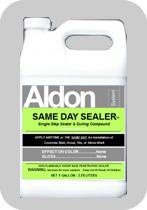Home | Surface Types | Problem Solving | Products | Prices & Ordering
Can water leaks be stopped by a sealer?
Water can wick through absorbent brick and tile. Obviously, a sealer will stop the wicking action if the water source is hitting the sealer first. However, significant water presence is usually from gaps in roof flashing, cracks in mortar/grout, etc.
You can go ahead and seal with the appropriate Aldon sealer first, but if water still shows up - look for places to caulk.
If you need to fill small cracks, use one of our solvent based acrylic sealers with the highest solids content that is recommended for your surface type and desired appearance. You might want to apply multiple times into cracks to get the needed filling effect.
How Can I Stop Water Seepage Coming Through My Walls Or Floor?
The best way is to seal the outside of the wall, not the inside, with the appropriate sealer. For a floor, or an earth backed wall where it is not feasible to do this there are non-Aldon products available that claim to stop moisture when applied to the wall opposite the earth side. These usually are very heavy bodied and significantly change the appearance of the surface. If that appearance change is unacceptable, and the moisture quantity is small (damp, not running), you may want to try to improve the situation with one of our sealers. If so, use "Same Day Sealer" using the deep penetration application.

"Same Day" is moisture tolerant in its application and may be able to create a sub-surface barrier to the water. However, any sealer only painted on the surface may not have a sufficiently strong bond to resist spalling (surface lifting) due to built up hydrostatic pressure.
Leaking from pooling, poor drainage, running down the wall.
Water leaking in from the base of windows, doors, ledges? Obviously, the horizontal areas should slope down and away from the building. If the slope is wrong, consider building a new slope in some manner. If the slope is good, but water curls down and around and runs back to the wall - consider cutting a shallow slot on the under side, a little in from the edge. Water should then flow to the cut and drip down from there to the ground without running down the wall.
Note:
Sometimes, despite your diligent research and the best of intentions of your suppliers salesperson, you might have been given the wrong information. Therefore, no matter how confident you are, whether first time user or seasoned professional, it just makes good sense to patch test a small area and evaluate the results in a few hours before doing a large area.
Most Aldon sealers have more than one area they can be used in any project. Check sealer information on the web site.